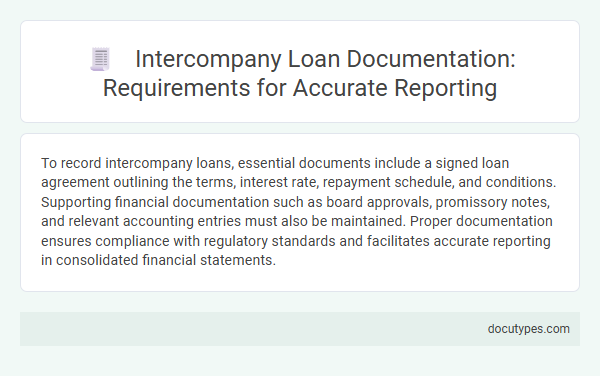To record intercompany loans, essential documents include a signed loan agreement outlining the terms, interest rate, repayment schedule, and conditions. Supporting financial documentation such as board approvals, promissory notes, and relevant accounting entries must also be maintained. Proper documentation ensures compliance with regulatory standards and facilitates accurate reporting in consolidated financial statements.
Introduction to Intercompany Loan Documentation
Intercompany loans require precise documentation to ensure clarity and regulatory compliance. Proper records facilitate accurate financial reporting and audit trails within corporate groups.
- Loan Agreement - Defines the terms, interest rate, repayment schedule, and obligations between affiliated entities.
- Board Resolutions - Authorize the loan transaction and provide internal approval evidence from both lending and borrowing companies.
- Promissory Note - Serves as a formal acknowledgment of the debt and legal commitment to repay according to agreed terms.
These documents collectively establish the framework for recording and managing intercompany loans effectively.
Importance of Accurate Intercompany Loan Reporting
| What Document Is Required for Recording Intercompany Loans? | |
|---|---|
| Key Documents |
|
| Importance of Accurate Intercompany Loan Reporting | |
| Accurate reporting of intercompany loans is critical for maintaining consolidation integrity and meeting regulatory compliance requirements. Precise documentation ensures transparency in financial relationships between entities within the same corporate group. Proper recording mitigates risks such as misstated assets or liabilities, which can lead to audit issues, tax complications, and misinformed decision-making. By establishing clear, verifiable records, you safeguard the accuracy of consolidated financial reports and enhance overall corporate governance. | |
Key Regulatory Requirements
Recording intercompany loans necessitates adherence to specific documentation to comply with regulatory frameworks. Key documents include the loan agreement, approval resolutions, and repayment schedules to ensure transparency and legal validity.
Regulatory requirements mandate that the loan agreement clearly defines the terms, interest rates, and repayment conditions. Approval resolutions from authorized corporate bodies validate the transaction and maintain corporate governance standards. Proper documentation supports audit trails and fulfills compliance obligations under accounting standards such as IFRS and GAAP.
Essential Elements of Intercompany Loan Agreements
Intercompany loan agreements must include specific documents to ensure proper recording and compliance. These documents establish clear terms and protect the interests of all parties involved in the loan transaction.
- Loan Agreement - A formal document outlining the principal amount, interest rate, repayment schedule, and obligations of the borrower and lender.
- Board Resolutions - Official approvals from both companies' boards authorizing the loan and confirming terms and conditions.
- Promissory Note - A written promise from the borrowing entity to repay the loan under the agreed terms, serving as evidence of the debt.
Supporting Documentation and Recordkeeping
Recording intercompany loans requires precise documentation to ensure legal compliance and accurate financial reporting. Supporting documentation and proper recordkeeping are essential for audit trails and effective internal controls.
- Loan Agreement - A formal written contract detailing loan terms, interest rates, repayment schedules, and obligations of both parties.
- Board Resolutions - Official approval documents from each company's board endorsing the loan transaction.
- Payment Records - Evidence of fund transfers, such as bank statements or payment confirmations, to track disbursements and repayments.
Transfer Pricing Considerations
What documents are essential for recording intercompany loans with respect to transfer pricing considerations? Proper documentation includes the loan agreement detailing terms, interest rates, and repayment schedules aligned with the arm's length principle. Supporting transfer pricing analysis and benchmarking studies must also be maintained to justify the pricing and avoid tax adjustments.
Audit Trail and Internal Controls
Documenting intercompany loans requires comprehensive records to ensure a clear audit trail and strengthen internal controls. Essential documents include loan agreements, repayment schedules, approval memos, and transaction logs.
Maintaining these records supports transparency and accuracy during audits, allowing verification of terms and transaction validity. Your organization's internal controls benefit by preventing unauthorized loans and ensuring compliance with financial policies.
Common Compliance Challenges
Recording intercompany loans requires specific documents such as loan agreements, board resolutions, and repayment schedules to ensure compliance with legal and financial standards. Common compliance challenges include maintaining accurate documentation, adhering to transfer pricing regulations, and ensuring timely reporting to avoid tax penalties. You must diligently gather and verify these documents to facilitate seamless audit processes and regulatory reviews.
Best Practices for Documentation and Reporting
Accurate documentation is essential for recording intercompany loans to ensure compliance and transparency. Key documents include loan agreements detailing terms, interest rates, repayment schedules, and authorization from relevant departments. Maintaining thorough records supports audit readiness and accurate financial reporting across entities.
What Document Is Required for Recording Intercompany Loans? Infographic

